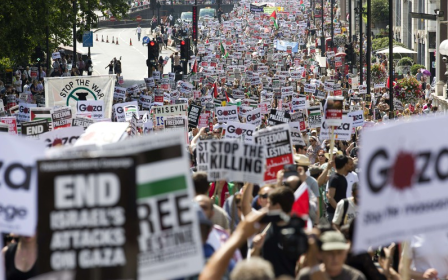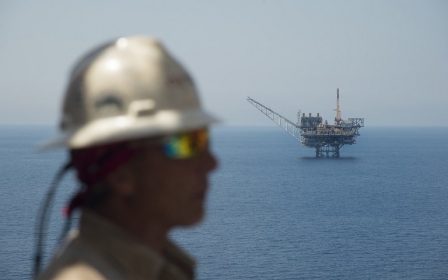The denied: The artistic collective barred by Israel

AMMAN - The repeated questions during the eight hours of waiting and interrogations at Allenby Bridge, on the Jordanian-West Bank border, come to Nicole's mind over and over again. “What are you hiding? Do you have any Arab relatives? Why the West Bank? Why don’t you go to sunbathe in Greece instead? What’s your political affiliation? Why are you lying to us?”
Every year, thousands of people of Palestinian origin or other nationalities are denied entry to Palestine by the Israeli border authorities, usually at Ben Gurion Airport or land borders such as the Allenby Bridge between Jordan and the West Bank.
Nicole C (not her real name), a 28-year-old Chilean-Palestinian, is one of them. “My grandfather left Palestine in 1948 and he never went back,” she tells MEE. “Listening to my grandfather’s stories and his native language, I decided to leave Chile for a year and visit Palestine.”
But she was denied entry on her first attempt to enter Palestine in 2015. Her dream then became a nightmare. At the time, the Israel border authorities did not explain the official reason why, but months later she figured it out: she had signed a petition against the Israeli attack on Gaza in 2008-2009.
As a result, she could not enjoy the scholarship which would have allowed her to live in Jerusalem for nine months, studying Arabic at al-Quds University.
'Every week I was meeting by chance someone who was denied entry as well and we started spontaneously to share our stories'
- Nicole C
It was not easy for her to restart her life in Jordan, she says, but “I didn’t go back to Chile because I wanted to learn my grandparents’ language”. Luckily, she managed to transfer the scholarship from al-Quds to the University of Jordan.
Nicole, who lived in Amman for a year, discovered that she was not alone in being denied entry. “Every week I was meeting by chance someone who was denied entry as well and we started spontaneously to share our stories,” she says.
“One day, we decided to make a project to transform the injustice we felt and the frustration we were living into something creative."
The creative collective
Every Monday the group met at different cultural centres or cafes in Jabal al-Weibdeh, an upcoming social hub near downtown Amman. The group consists of youngsters from many different nationalities: French, Spanish, Italian, Belgian, Danish, Chilean, American, British, even a Chinese student who was denied entry when she planned to spend a weekend in Jerusalem.
The official reason given by the Israeli border police was “fear of illegal settlement".
Zoubi, who has lived in Amman all his life, says he has met tens of people who have been denied entry and wanted to contribute to the creative collective with his art. Moreover, he says, he has always felt denied entry since birth to his grandparents’ land.
“As a Palestinian with a Jordanian nationality, I wanted to speak against the issue of the denial of entry into Palestine but also about freedom of movement more generally," he says.
He cites the lyrics he sings at the beginning of the Denieedeen song: "I am not an immigrant nor do I want to leave the country, I want a legal way to travel wherever I want."
Soon after, Hussien Amody, a young video-maker who was born and raised in Gaza until 2014, joined the group. He left Gaza for Egypt and from there crossed the Red Sea to Jordan. As a Gazan in the Hashemite kingdom of Jordan he has a special stamp in his passport marking his origin - Gaza.
'The border is a shocking experience and the feeling of being refused has no nationality'
- Hussien Amody
This year Amody marked the third anniversary of his departure from Gaza: neither Israeli nor Egyptian authorities have granted a visa to re-enter the territory.
“During the meetings, very often someone would be crying while telling his/her story," he says. " The border is a shocking experience and the feeling of being refused has no nationality."
Aliz Sanchez, a Spanish violinist who was denied entry into the West Bank in 2015 to see her Palestinian husband in Ramallah, composed the violin part of the music for the collective. She returned to Spain where, eventually, her husband was able to join her.
Meanwhile Marta M (not her real name), an Italian working in Amman for a humanitarian NGO, invented their name: al-deniedeen.
She explains it comes from the English word ‘denied’ with the Arabic suffix of "ammia [spoken language], the plural -een added to mark that, despite Israel’s intention to isolate Palestinians from the international community, we are all here together as al-deniedeen”.
International call for Deniedeen
The creative collective has invited people internationally to share their stories and send them a scanned copy of their passport page with the denied entry Israeli stamp.
“I was happily surprised when [Professor] Noam Chomsky replied to our email!” says Nicole. “Also his daughter Aviva Chomsky was denied and they were both supportive of the project, sending their stories.”
The plan was to make a rap video to raise awareness about being denied entry to Palestine by relating personal experiences.
“More specifically, the song highlights the psychological torture at the border,” says Zoubi, “and the impossibility for the Palestinian people to move freely inside and outside of their homeland.”
The number of people worlwide who have been denied entry to Palestine has increased. In 2016 alone, Israel refused entry to 16,534 people, a nine-fold surge in five years. Most of those denied are for periods of five or 10 years.
During interrogations, officials sometimes explain that the 10-year period is usually applicable to people who have overstayed their Israeli visas or have taken "illegal" action, such as joining one of the peaceful Friday demonstrations against the wall. Israel considers this a security threat.
Visitors are not always told for how long they will be denied entry. Instead, most only discover through the Israeli embassy in their home countries or during a second unlucky attempt
But visitors are not always told at the border for how long they will be denied entry. Instead, most only discover through the Israeli embassy in their home countries or during a second unlucky attempt.
“After months and months, I decided to go to the Jordanian-Israeli border to find out if I was denied only once or for years,” Nicole tells MEE. “So, I figured out: five years. They consider me not 'a friend of Israel' because I signed a petition against the Israeli attack on Gaza and so I was not welcome in."
The situation is only expected to worsen: last March the Knesset passed a law barring entry to foreign visitors who support the Boycott, Divestment and Sanctions Movement (BDS), or even call for the boycott of the illegal Israeli settlements in the West Bank.
'I have never felt more Palestinian'
The idea of a video came from the experience of Hannah P (not her real name), a Londoner who was teaching capoeira in Palestine.
“I had lived in Ramallah for about a year and entered many times," she says. "But at the third time I feared that they would not let me in any more. I decided to start dressing up and every time I came through the airport, I wore a very tight skirt, heels and make up and played the role of a businesswoman. While waiting in line at the immigration check, I feigned disinterest and pretended to be talking on a smartphone while giving my passport to them."
That time, Hannah entered Israel. But on another occasion, when she was not wearing business attire, she was denied entry. “The official reasons were that I did not inform them immediately of my visit to Ramallah and I was rude, they said."The Deniedeen video clip shows Hannah dressed up as a businesswoman and Nicole as a traveller heading from Amman to the Allenby Bridge crossing point, where Jordan borders Palestine. The taxi driver is a Palestinian-Jordanian. At the end, after being denied entry into Palestine, they are in front of the Dead Sea, sharing the same destiny: looking at Palestine from Jordan and not being allowed to cross that border.
The video was supported by the Palestine International Institute in Jordan and donations from Chilean-Palestinian families. Zoubi delivered the lyrics in his Palestinian-Jordanian dialect, but a chorus of multilingual sentences concludes the clip, including Italian, Spanish, Belgian, English and others.
“We asked each member of the group to write a short sentence which could quickly represent their stories and their feelings about being denied,” says Zoubi. “We recorded them in order to mix them all up and make this video not just as a Palestinian story but an international one.”
Nicole says she went into the studio unprepared, but then the sentence she would record came to mind: nunca me sentì tan Palestina. It translates as: "I have never felt more Palestinian.”
Stay informed with MEE's newsletters
Sign up to get the latest alerts, insights and analysis, starting with Turkey Unpacked
Middle East Eye delivers independent and unrivalled coverage and analysis of the Middle East, North Africa and beyond. To learn more about republishing this content and the associated fees, please fill out this form. More about MEE can be found here.







